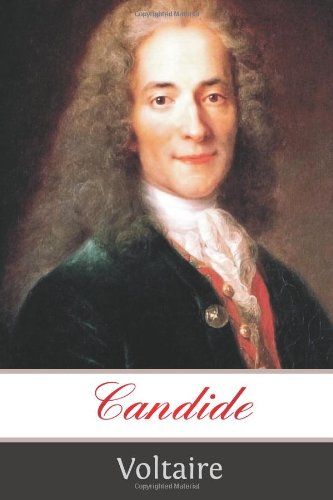All Nonfiction
- Bullying
- Books
- Academic
- Author Interviews
- Celebrity interviews
- College Articles
- College Essays
- Educator of the Year
- Heroes
- Interviews
- Memoir
- Personal Experience
- Sports
- Travel & Culture
All Opinions
- Bullying
- Current Events / Politics
- Discrimination
- Drugs / Alcohol / Smoking
- Entertainment / Celebrities
- Environment
- Love / Relationships
- Movies / Music / TV
- Pop Culture / Trends
- School / College
- Social Issues / Civics
- Spirituality / Religion
- Sports / Hobbies
All Hot Topics
- Bullying
- Community Service
- Environment
- Health
- Letters to the Editor
- Pride & Prejudice
- What Matters
- Back
Summer Guide
- Program Links
- Program Reviews
- Back
College Guide
- College Links
- College Reviews
- College Essays
- College Articles
- Back
Candide by Voltaire
Throughout Voltaire's novel Candide, the "metaphysico-theologo-cosmolo-nigologist" Pangloss, who symbolizes the quixotic Enlightenment philosopher von Leibniz, insists that "all is for the best", that men live in an ultimately good world (2). The only situation in the book for which this philosophy reigns true is in Eldorado. In Eldorado, all men and women and their children are joyful, and both the government and its people are so rich that what they call "yellow mud" is pure gold, and what they call pebbles are diamonds and other precious stones (43, 49).
Candide leaves this utopia because, of course, it is missing his true love--Mademoiselle Cunégonde. He is happy except for that fact, so he convinces Cacambo that in returning to Europe, the two would be the richest of all men, would not have to fear imprisonment for murder, and would find women (48-9). "You are doing a foolish thing," the king of Eldorado tells Candide, and indeed he has pangs of regret throughout the rest of the novel.
As a Catholic Christian, I believe that the equivalent of Eldorado is heaven, especially when the book illustrates its bountifulness and mentions that one can never return there if he chooses to leave it (49). In this way, I would not have left Eldorado, even for my loved ones, because they would make their way to heaven in time, after passing away.
Perfection does not exist in this life. Just as Candide's Eldorado is missing the protagonist's significant other, we as humans must constantly address adversity as well as our own flaws. There are always sacrifices.
On a personal note, I gave up time I could have been spending with my friends to prepare for an audition to be in one of the premiere youth orchestras in the country, back in November. I hope I will be accepted into the orchestra, instead of ending up like Candide, who leaves paradise only to discover that the woman he had been dreaming of had lost her beauty. If things do not turn out as I want them to, however, I will push myself to move on, to find other sources of happiness, to "cultivate [my] garden," as it says in the last line of the book (96).
Similar Articles
JOIN THE DISCUSSION
This article has 0 comments.

